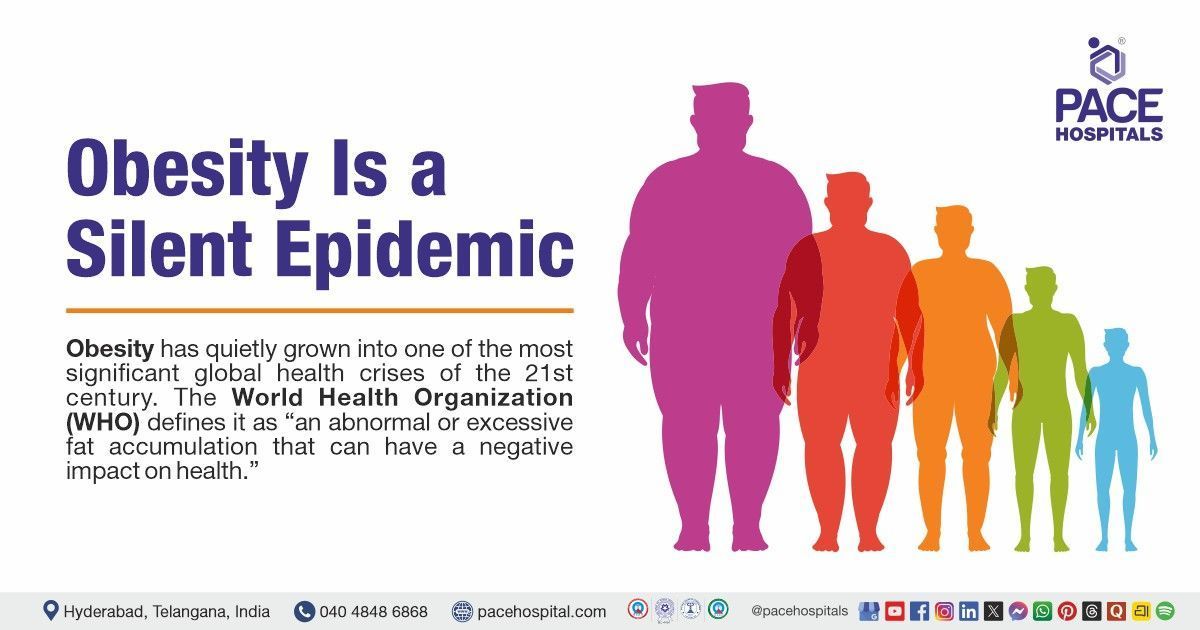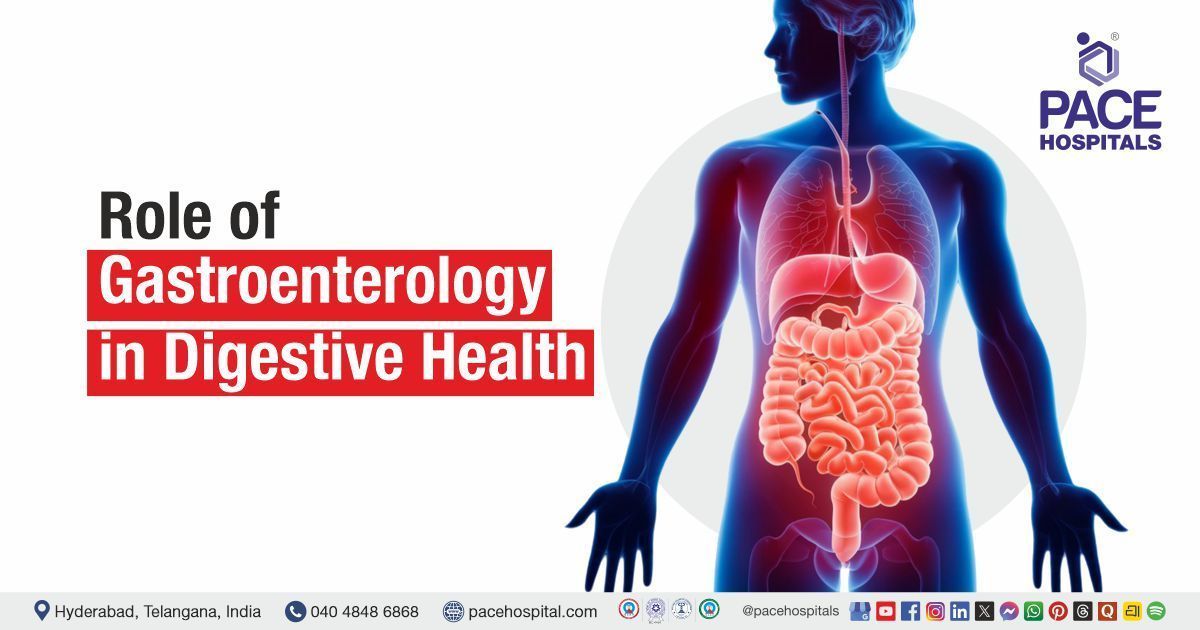Understanding Why Obesity Is Called a Silent Epidemic
PACE Hospitals
Written by: Editorial Team
Medically reviewed by: Dr. Tripti Sharma - Consultant Endocrinologist (Adult & Paediatric), Physician & Diabetologist
Understanding the Global Challenge
Obesity has quietly grown into one of the most significant global health crises of the 21st century. The World Health Organization (WHO) defines it as "an abnormal or excessive fat deposition that can have a negative impact on health."
It occurs due to an energy imbalance — when the calories generally consumed exceed the calories burned through physical activity and metabolism. This imbalance gradually leads to fat accumulation and, over time, causes a wide range of health complications including diabetes, heart disease, hormonal disorders, arthritis, and even certain cancers.
At PACE Hospitals, Hyderabad, our multidisciplinary teams of endocrinologists, dietitians/nutritionists, and bariatric surgeons are dedicated and committed to helping individuals understand, prevent, and overcome obesity through evidence-based treatments, personalized nutrition programs, and long-term lifestyle support.
The Role of Junk Food in the Obesity Epidemic
Why Junk Food Feeds the Problem
Modern diets are heavily influenced by high-calorie, low-nutrient processed foods, often known as junk food. These foods are rich in sugar, refined carbohydrates, trans fats, and sodium but lack of vitamins, minerals, and essential nutrients.
Examples include:
- Deep-fried snacks
- Packaged sweet items and pastries
- Sugary beverages
- Fast foods and instant noodles
- Processed meats and sauces
Such foods trick the brain’s reward system — releasing dopamine (hormone), a chemical that creates feelings of pleasure and satisfaction. This neurological "reward loop" encourages people to eat more, even when they're not hungry.
Why Junk Food Is Addictive
Junk food affects the same brain pathways that respond to addictive substances like nicotine or alcohol. Several studies shows that sugar and fat activate dopamine release, reinforcing cravings. Over time, the brain starts getting associated with these foods for comfort and stress relief, leading to overeating and emotional eating.
In contrast, whole foods consumption like fruits and vegetables don't overstimulate the brain's reward centers — which is why people find it harder to crave healthy options when they’re used to eating processed foods.
The Brain–Body Connection
The more junk food we eat, the more our hunger and satiety hormones (ghrelin and leptin) become dysregulated. This makes us hungrier more often, even if our body already has enough stored energy.
This vicious cycle contributes to:
- Insulin resistance
- Chronic inflammation
- Weight gain
- Fatigue and low energy
The Power of Nutrition: How to Reverse the Trend
Reversing obesity doesn't require fad diets intake or deprivation — it begins with balanced nutrition and mindful eating.
PACE Hospitals’ clinical dietitians recommend the following:
Replace Processed Foods with Whole Foods
Choose:
- Fruits and vegetables for vitamins, antioxidants, and fiber.
- Legumes and lentils for plant-based protein.
- Whole grains (oats, brown rice, millets) instead of refined carbs.
- Nuts and seeds in moderation amount for healthy fats.
Reduce Sugar and Saturated Fats
Cut down on:
- Soft drinks, packaged juices, and desserts intake.
- Fried and fast foods.
- White bread and refined flour products.
Replace them with healthier food options like homemade smoothies, green tea, and whole fruit desserts.
Mindful Eating Habits
- Eat slowly and chew the food thoroughly.
- Avoid eating in front of screens.
- Stop when you feel satisfied, not stuffed.
- Drink some amount of water before meals to control portion size.
Hydration and Detox
Adequate hydration supports digestion and fat metabolism. A 28-day detox program or lifestyle changes focusing on hydration, natural foods, and digestive rest can help you reset your metabolism and wean your body off sugar and fat cravings.
Such ways detoxes, when supervised by medical professionals, also improve gut health, skin clarity, and mood balance.
The Importance of Physical Activity
Diet alone cannot resolve obesity. The energy equation depends equally on calorie expenditure, which means exercise or physical activity is also an essential pathway for maintaining or reducing body weight.
Recommended Exercises or Physical Activities
- Regular brisk walking or jogging (30–45 minutes daily)
- Swimming, Cycling, or yoga
- postures practice
- Improve training skills to build muscle strength and boost metabolism
- Avoiding prolonged sitting position — Try to stand or stretch every hour
At PACE Hospitals, obesity management not only includes customized fitness plans but also physiotherapy programs designed especially for individual needs and health conditions.
Understanding Body Mass Index (BMI)
Body Mass Index (BMI) is a simple measure of body fat both for men and women based on height and weight.
BMI Formula:
BMI = Weight (kg) / Height (m²)
Classification (for adults):
- Underweight: Below 18.5
- Normal: 18.5 – 24.9
- Overweight: 25.0 – 29.9
- Obese: 30 and above
For example, a person having weight of 80 kg with a height of 1.7 m has a BMI of: 80 / (1.7 × 1.7) = 27.7 (Overweight) However, BMI alone doesn't speak about the whole story. Waist-to-hip ratio, visceral fat, and muscle mass are also important indicators of health.
At PACE Hospitals, advanced body composition analysis helps patients get a clearer picture of their metabolic health beyond just weight.
Health Risks of Obesity
Obesity increases the risk of over 200 health conditions. Some of the most common include:
- Type 2 Diabetes – due to insulin resistance
- Heart disease & hypertension – from increased fat and cholesterol
- Stroke – due to blocked arteries
- Sleep apnea – from fat deposits around airways
- Arthritis – from excess joint pressure
- Infertility & hormonal imbalance – especially in women
- Certain cancers – including breast, colon, and uterine
In India, obesity is a growing public health concern, especially in urban areas like Hyderabad, where sedentary lifestyles and processed diets are common.
How PACE Hospitals Manages Obesity
PACE Hospitals provides a comprehensive, medical-grade obesity management program that focuses on long-term results, not quick fixes.
Multidisciplinary Approach Includes:
- Endocrinologist consultation – to rule out any hormonal causes.
- Nutrition therapy – with personalized diet plans.
- Exercise and physiotherapy programs – tailored to fitness levels.
- Behavioral counseling – to address emotional attachment and stress-related to eating habits.
- Bariatric (weight-loss) surgery – for patients with severe obesity (BMI > 40) or obesity-related diseases.
Advanced minimally invasive laparoscopic and robotic bariatric surgeries are available at PACE Hospitals Hyderabad, with high success rates and comprehensive pre- and post-operative support.
Cost of Obesity Treatment in Hyderabad
At PACE Hospitals, Hyderabad, the cost of obesity evaluation and management depends on the personalized treatment plan:
- The nutritional assessment and counseling sessions generally cost between ₹1,000 and ₹2,000, depending on the duration and level of dietitian support.
- A comprehensive obesity profile, including laboratory investigations and body composition scans, is typically priced between ₹5,000 and ₹10,000.
- A 28-day detox and fitness program ranges from ₹10,000 to ₹15,000, based on the selected plan and required level of supervision.
- For Bariatric surgery, when recommended, usually costs between ₹2,00,000 and ₹3,50,000 (approximately USD $2,400 – $4,200), depending on the procedure type and hospital stay duration.
PACE Hospitals offers EMI Options, cashless insurance, and corporate wellness programs for obesity and metabolic health.
Long-Term Prevention Tips
- Eat real food — not products.
- Prioritize sleep (7–8 hours daily).
- Manage stress with yoga or mindfulness.
- Avoid sugary drinks — choose water or herbal teas.
- Monitor your weight and BMI regularly.
- Visit your doctor annually for health screenings.
Remember: Obesity develops over time — and it can be reversed over time with the right care and discipline.
Frequently Asked Questions (FAQs) on Obesity
What causes obesity?
Obesity in general results from an energy imbalance between the calories consumed and burned. Genetics, diet, inactivity, hormones, and stress also play major roles.
How can obesity be prevented?
To prevent obesity try to eat whole foods, limit processed items, stay active, manage stress, and get regular health checkups. PACE Hospitals offers expert lifestyle guidance.
What health issues are linked to obesity?
Diabetes, heart disease, arthritis, hormonal disorders, sleep apnea, and certain cancers are strongly linked with obesity.
What is a healthy BMI range?
For adults a BMI between 18.5 and 24.9 is considered healthy weight range. PACE Hospitals offers body composition analysis for accurate weight and fat assessment.
How much does obesity treatment cost in Hyderabad?
Costs at PACE Hospitals range from ₹5,000 for diagnosis to ₹3,50,000 for surgery, depending on individual needs and treatment plans.
Why is obesity called a silent epidemic?
Because it progresses slowly without obvious early symptoms, yet increases the risk of chronic diseases like diabetes, hypertension, and heart disease.
Does junk food really cause obesity?
Yes. Junk foods are those foods high in calories, sugar, and unhealthy fats that stimulate the brain's reward system (the mesolimbic pathway), leading to overeating and fat accumulation in the body.
Can obesity be treated without surgery?
Yes. In most cases obesity can be managed through change in diet, exercise, and medical therapy. Bariatric surgery is reserved for severe or resistant obesity.
What is the role of detox programs in weight loss?
A 28-day medically supervised detox helps reset metabolism, reduce cravings, and build sustainable healthy habits.
Why choose PACE Hospitals for obesity management?
PACE Hospitals provides a multidisciplinary approach — expert doctors, nutritionists, fitness professionals, and bariatric surgeons — all under one roof.
Share on
Request an appointment
Fill in the appointment form or call us instantly to book a confirmed appointment with our super specialist at 04048486868











